Herodian
Herodian (c.170-c.240): Greek historian, author of a History of the Roman Empire. The full text can be found here.
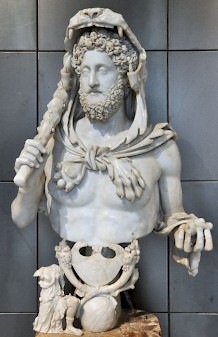
Life
Herodian's life is almost unknown to us, but we can reconstruct several elements of it from his History of the Roman Empire since Marcus Aurelius, which is a lively and accessible book that might also have been titled Crises in Rome, as it describes the Year of Five Emperors (193) and the Year of Six Emperors (238).
As his History of the Roman Empire was published after 240, Herodian cannot have been born much earlier than the 170s. Now, he statesnote that he is describing the reigns of those emperors which he knew through personal experience, and says that this covered a period of seventy years. This is incorrect - he in fact describes about sixty years - but perhaps seventy was his age in c.240, which is not inconsistent with a date of birth in the 170s.
Maybe, his native city was Antioch, because he writes for an eastern audience, explaining Roman customs and beliefs.note He is also generally being very kind towards the Syrians.note On the other hand, he informs his readers that "in our part of the world" there are no mountains comparable to the Alps,note which no one from Syria, situated between Taurus and Lebanon, can have written.
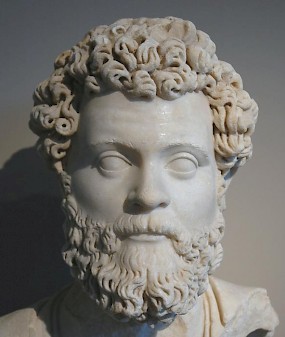
It is possible that as a boy or young man, he was living in Rome, because he appears to have been an eyewitness to Commodus' performance as a gladiator in the Colosseum.note However this may be, Herodian must have served the Roman government as a public servant in the capital, but his function was not extremely important, because he nowhere shows great understanding of politics or military strategy. His introduction suggests that he was an apparitor (the assistant of a a prefect or a procurator) during the reign of the emperor Maximinus (235-238), which in turn suggests that he was probably the son of a freedman, or perhaps a Roman knight.
Although this point must not be overstressed, Herodian's lower rank is more or less corroborated by the fact that he does not share the conservative world view of a senator. He seems not to have traveled very much, although his description of the frozen Rhine may betray autopsy.note Anyhow, and most importantly, he knew how to tell a good story, which is the first quality of a good historian.
Historian
The History of the Roman Empire since Marcus Aurelius is a truly good read. (A table of contents is here.) Roman history had never been so chaotic, fascinating, and abnormal. Herodian describes the reign of seventeen emperors: only one of them died a natural death, one of them was a very old man, another a boy of thirteen, one of them a priest of the Syrian sun god Elagabal. He is clearly fascinated by street fights between the citizens of Rome and soldiers of the imperial guard. Civil wars, foreign enemies, plagues, fire, and earthquakes complete the colorful picture.
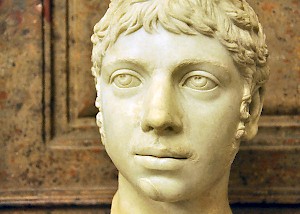
There is no need to doubt that Herodian was shocked by all bloodshed: the central scene, exactly in the middle of the book, is Caracalla killing Geta in the arms of their mother Julia Domna. On the other hand, there is the moving story about the old Pertinax, who receives visitors during the night, recognizes the praetorian prefect, understands that he will be killed, and is instead offered the throne - an offer that, at first, he believes to be a bad joke.
Unfortunately, Herodian is, as a historian, not the equal of his older contemporaries
His descriptions of events in the capital of the Mediterranean world are far better than his accounts of foreign wars and foreign nations, which are usually second-hand. For example, his account of the Parthian campaigns of Septimius Severus appears to depend upon a misreading of the reliefs on the Arch dedicated to this emperor. Still, he is the only one to describe Severus Alexander's campaign against the Sasanian king Ardašir - and even though his account is insufficient, it is better than nothing.
Significance
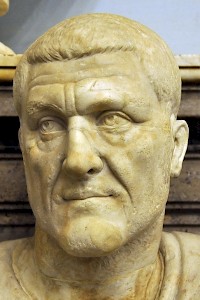
Modern scholars have long regarded his information as unreliable, and indeed, he is not as good a historian as Cassius Dio, who has covered more or less the same subject matter. However, this criticism is not entirely fair. Herodian's lack of literary and scholarly pretensions makes him less biased than the senatorial historians. (In fact, he is - with Velleius Paterculus - one of the few non-senatorial historians of the Roman Empire; this in itself makes him an important writer.) His description of the cultic reforms and religious innovations by the emperor Heliogabalus, who wanted to introduce the cult of the Syrian sun god, is less hostile than that of Dio. He refrains from the irrelevant descriptions of sexual practices that can be found in the publications by so many other historians. He has an open eye for the role of empresses like Julia Domna, Julia Maesa, Julia Soaemias, and Julia Mamaea. Today, he is regarded as an independent and more or less unbiased, although uncritical, author who offers colorful information about events in Italy.
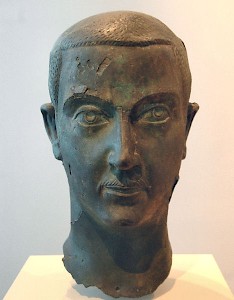
Herodian's influence is greater than one would have expected. The anonymous author of the Historia Augusta, the historians Eutropius, Aurelius Victor, and Ammianus Marcellinus all used the History of the Roman Empire. Byzantine scholars have recommended Herodian's style, which is indeed clear and fluent. He knows how to compose and where to insert a good speech (like the fine speech by Maximinus Thrax in the seventh book.note His book is a good read - and that is what he wanted to produce.
Modern literature
Herodian is almost ignored by modern scholars. The only recent edition, with an excellent introduction but slightly disappointing commentaries, is F.L. Müller, Herodian. Geschichte des Kaisertums nach Marc Aurel: Griechisch und Deutsch (1996 Stuttgart).
The full text can be found here.